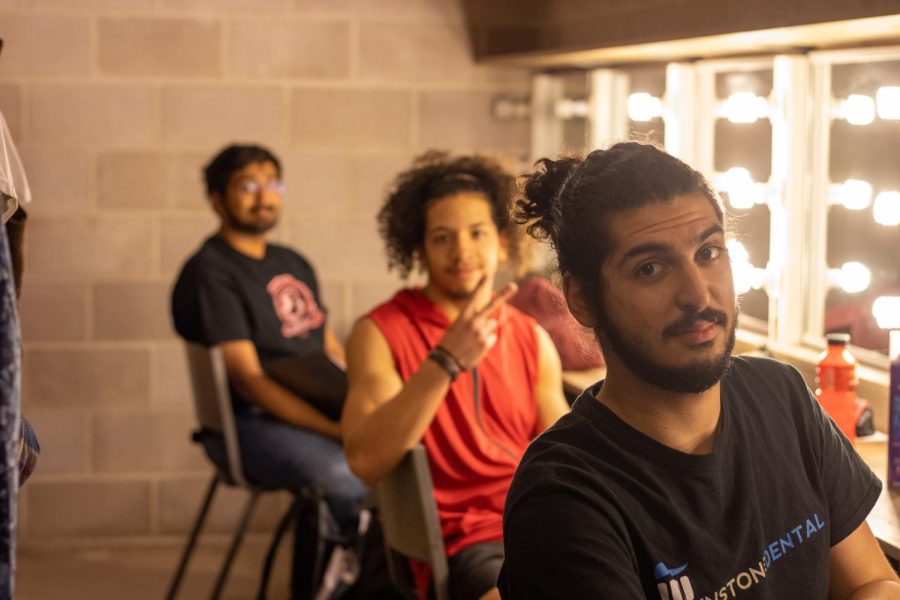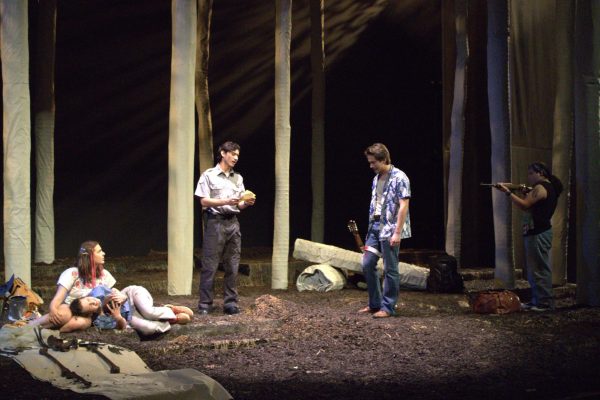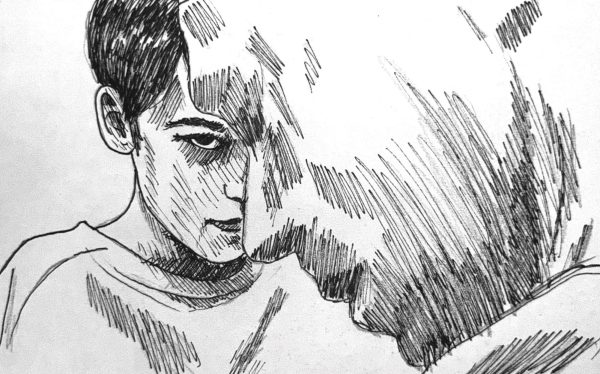Upcoming theater production navigates casting controversy
A close look at Trinity Theatre’s upcoming production of “Could You Please Look into the Camera?”
Actors in “Could You Please Look Into the Camera”
“Could You Please Look into the Camera?” follows the interviews of young protesters during their detention by the Bashar Assad regime. The play, written by Syrian playwright Mohammad Al Attar, will be performed by the Trinity University Theatre Company from Feb. 17-19 and 22-25 in the Attic Theater inside the Ruth Taylor Theater building.
Since its initial proposal to the student body, the play has sparked controversy. Its story follows a filmmaker, Nura, as she captures the interviews of three young protesters during their detention in the Syrian civil uprisings of 2011. During the original run of the play, the Syrian characters were portrayed by a cast with the same ethnic background.
Miles Bourgeois, a first-year engineering science major and set worker for the company, explained that students were concerned that white American and other non-Syrian students would be “forced” into portraying the life and experiences of people from the Middle East. Such casting could then leave room for misinterpretation or a weakening of the play’s intended messages.
“I think some students had reservations because the play is about the experiences of people from the Middle East and, reasonably, there was a concern that white people would be forced to take the roles of them,” Bourgeois said.
As Heather Anne Chamberlain, a New York City-based theater artist, explains in her review of Attar’s work, the play aims to combat the typical “apathetic tendencies towards human suffering in the contentious Middle East.”
Some students at Trinity acknowledge this goal and find that it should be done justice with a cast that ethnically fits the part.
However, this goal is not fully achievable for Trinity’s production this semester due to Trinity’s small student body. The play will be moving forward with only one Syrian actor whose perspective the rest of the cast said has been integral to their production.
Already, this production has garnered the attention of students in the theatre department, but the production has continued to push past students’ concerns. Non-Syrian students who were cast will be faced with a challenging reenactments, and they will need to tackle their roles with sensitivity and emotion, all while remembering their lines.
Student concerns were eventually taken into consideration by the play’s performance director, Roberto Prestigiacomo, who assured students that the controversial nature of the play would be addressed in its advertisement to potential viewers. Most marketing for the play has comprised of posters which include the title of the play, and a descriptive paragraph on the University’s event page.
Students in the production were uncertain if their portrayal of ethnic characters would produce the positive and enlightening response the director seemed to hope for. Concerns about casting pushed some actors away from the auditions entirely.
Dylan Hoffman, a first-year marketing major, theatre minor and costume department worker, has been working closely with the crew throughout all stages of the production and has been witness to the issues faced by cast members.
“Students were understandably nervous as this was unfamiliar territory for them,” Hoffman said.
With the acting challenge aside, some cast members still felt uncomfortable with the performance as they did not feel that what they were presenting to the audience was reflective of the play’s central issues.
“The advertisements did not accurately reflect the controversy, and choosing to put on the play in the first place was a questionable decision, but the department appears to have listened to a lot of the student concerns,” Bourgeois said.
In addition to issues regarding casting, set designers had to take care to portray the emotions of the play in a manner representative of its messages. Since theater productions are generally highly dependent on visuals, from set and costume design to physical acting choices, the construction of the set for this play was treated with the same importance as its casting.
“I do think the scenic design properly reflects the emotions of the play,” Bourgeois said.
With this aspect of the play being taken care of respectfully, student reservations about the play have arisen largely as a result of its non-representative cast.
Despite initial concerns, the play was able to attract a full cast and has moved forward into the final stages of production.
“Dr. Prestigiacomo has put in a lot of effort to make his actors comfortable on set,” Hoffman said. “He’s been in contact with the playwright, Office of Student Diversity & Inclusion, as well as others to host discussions about student concerns.”
However, at the end of the day, it is at the discretion of the actor themself to decide whether or not they are willing to put in the effort it takes to respectfully portray a character. And it is ultimately up to the viewer to look past casting choices and grasp the strong messages this performance may have to offer.
“As someone who sees the show from behind the scenes, it is one of the most comfortable and safe sets I’ve ever been on,” Hoffman said. “Everyone understands the importance of their role and the story they are sharing.”
A prior version of this story wrote that the cast was fully non-Syrian. This is incorrect; one cast member is Syrian.





